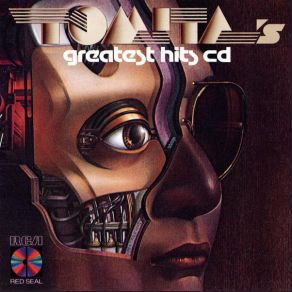Tomita's Greatest Hits
Download links and information about Tomita's Greatest Hits by Tomita. This album was released in 1980 and it belongs to New Age, Electronica genres. It contains 14 tracks with total duration of 01:10:18 minutes.

|
|
|---|---|
| Artist: | Tomita |
| Release date: | 1980 |
| Genre: | New Age, Electronica |
| Tracks: | 14 |
| Duration: | 01:10:18 |
| Buy it NOW at: | |
| Buy on iTunes $9.99 | |
| Buy on Amazon $9.99 | |
Tracks
[Edit]| No. | Title | Length |
|---|---|---|
| 1. | Also Sprach Zarathustra: Fanfare | 2:04 |
| 2. | Grand Canyon Suite: Grand Canyon Suite / On the Trail | 7:10 |
| 3. | Canon In D | 5:51 |
| 4. | Syncopated Clock | 2:32 |
| 5. | Boléro | 9:18 |
| 6. | Star Wars: Main Title | 3:09 |
| 7. | Suite Bergamasque: Suite Bergamasque / Clair de Lune, No. 3 | 5:51 |
| 8. | Close Encounters of the Third Kind | 3:44 |
| 9. | Symphony No. 5: Symphony No. 5 / Allegro Marcato | 5:22 |
| 10. | Children's Corner: Children's Corner / Golliwogg's Cakewalk, No. 6 | 2:56 |
| 11. | Firebird Suite: Firebird Suite / Infernal Dance of King Kastchei | 4:22 |
| 12. | Hora Staccato | 3:32 |
| 13. | The Planets: The Planets / Mars, The Bringer of War | 7:53 |
| 14. | Pictures At an Exhibition: Pictures At an Exhibition / The Great Gate of Kiev | 6:34 |
Details
[Edit]Isao Tomita's electronic covers of classical pieces may sound outdated and primordial, but his rather basic keyboard applications and simplistic approach are rather interesting, mainly because of their austerity. Overshadowed by keyboard kingpins like Emerson, Lake & Palmer and Rick Wakeman, who were making lengthy progressive rock opuses in the '70s with the same means of instrumentation (only to a greater extent and with a greater degree of pretentiousness), Tomita's material was somewhat bypassed. His Greatest Hits sums up most of his worthy accomplishments, with the exception of The Planets, an electronic adaptation of Holst's most famous work that should be heard on its own. The best track from that album is represented here in the form of Mars, while other notable pieces such as Debussy's Claire de Lune and Mussorgsky's Pictures at an Exhibition are just as interesting. Tomita's straightforward and undecorated style of keyboard playing may not harbor the whirlwind frenzy of other artists, but this is where the adoration lies. Even his version of the Star Wars theme is somewhat attractive, while Strauss' Also Sprach Zarathustra sounds charmingly conventional to say the least. Classical fans may indeed shudder, but tastes that are geared toward the rawest form of the Moog synthesizer and the like need only this album to experience Tomita's informal brand of keyboard work.